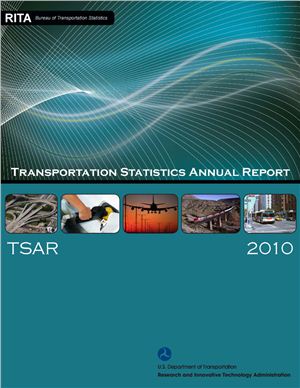Authors: U.S. Department of Transportation, Research and Innovative
Technology Administration, Bureau of Transportation Statistics.
RITA Bureau of Transportation Statistics, 2011. - 221 pages.
That is annual transportation statistic report of The Bureau of Transportation Statistics (BTS). The report presents and analyzes data on safety, the state of good repair of the U.S. transportation system, economic competitiveness, livable communities, passenger expenditures, and environmental sustainability, and explores how to improve transportation statistics. .
The Annual Highlights section focuses on recent U.S. Department of Transportation data collection and analysis, including surveys of state funding for public transportation, public satisfaction with transportation's support of livable communities and environmental sustainability, and hazardous materials shipments. This section also reviews commercial aviation and the airline industry data reported by BTS' Office of Airline Information. .
Table of Contents.
CHAPTER 1: Annual Highlights.
Survey of State Funding for Public Transportation.
Livable Communities and Environmental Sustainability.
Commodity Flow Survey/Hazardous Materials.
Commercial Aviation and Airline Industry Highlights.
CHAPTER 2: U.S. Transportation System.
Safety.
State of Good Repair.
Extent and Condition of Transportation Systems.
Vehicle Age.
Transportation Expenditures.
Economic Competitiveness.
Domestic Productivity and Output.
Inteational Freight and Passenger Movement.
Livable Communities.
Availability and Usage.
Accessibility.
Congestion and Travel Times.
Passenger Expenditures.
Expenditures on Motor Vehicle Related Transportation.
Prices Paid to Motor Vehicle Related Transportation.
Costs of Owning and Operating Motor Vehicles.
Average Airfare.
Highest and Lowest Average Domestic Airfare by Origin Airport.
Environmental Sustainability.
Environmental Impacts of Transportation.
Energy Consumption and Prices.
CHAPTER 3: Improving Transportation Statistics.
Improving Transportation Statistics.
Ensuring Information Quality.
Improving Data Quality.
Commodity Flow Survey.
Freight Analysis Framework.
Vehicle Inventory and Use Survey.
Airline Information.
Maritime Data.
Intermodal Passenger Connectivity Database.
Distracted Driving.
National Household Travel Survey.
Geospatial Information Services.
Transportation Services Index.
National Transportation Library.
Inteational Data Exchanges.
Transportation Research Board.
Key Transportation Indicators.
APPENDICES.
A. U.S. Social and Economic Characteristics.
B. Acronyms, Abbreviations, and Initialisms.
C. Glossary.
D. Legislative Responsibilities, including Cross Reference.
E. National Transportation Statistics List.
F. Key Transportation Indicators List.
RITA Bureau of Transportation Statistics, 2011. - 221 pages.
That is annual transportation statistic report of The Bureau of Transportation Statistics (BTS). The report presents and analyzes data on safety, the state of good repair of the U.S. transportation system, economic competitiveness, livable communities, passenger expenditures, and environmental sustainability, and explores how to improve transportation statistics. .
The Annual Highlights section focuses on recent U.S. Department of Transportation data collection and analysis, including surveys of state funding for public transportation, public satisfaction with transportation's support of livable communities and environmental sustainability, and hazardous materials shipments. This section also reviews commercial aviation and the airline industry data reported by BTS' Office of Airline Information. .
Table of Contents.
CHAPTER 1: Annual Highlights.
Survey of State Funding for Public Transportation.
Livable Communities and Environmental Sustainability.
Commodity Flow Survey/Hazardous Materials.
Commercial Aviation and Airline Industry Highlights.
CHAPTER 2: U.S. Transportation System.
Safety.
State of Good Repair.
Extent and Condition of Transportation Systems.
Vehicle Age.
Transportation Expenditures.
Economic Competitiveness.
Domestic Productivity and Output.
Inteational Freight and Passenger Movement.
Livable Communities.
Availability and Usage.
Accessibility.
Congestion and Travel Times.
Passenger Expenditures.
Expenditures on Motor Vehicle Related Transportation.
Prices Paid to Motor Vehicle Related Transportation.
Costs of Owning and Operating Motor Vehicles.
Average Airfare.
Highest and Lowest Average Domestic Airfare by Origin Airport.
Environmental Sustainability.
Environmental Impacts of Transportation.
Energy Consumption and Prices.
CHAPTER 3: Improving Transportation Statistics.
Improving Transportation Statistics.
Ensuring Information Quality.
Improving Data Quality.
Commodity Flow Survey.
Freight Analysis Framework.
Vehicle Inventory and Use Survey.
Airline Information.
Maritime Data.
Intermodal Passenger Connectivity Database.
Distracted Driving.
National Household Travel Survey.
Geospatial Information Services.
Transportation Services Index.
National Transportation Library.
Inteational Data Exchanges.
Transportation Research Board.
Key Transportation Indicators.
APPENDICES.
A. U.S. Social and Economic Characteristics.
B. Acronyms, Abbreviations, and Initialisms.
C. Glossary.
D. Legislative Responsibilities, including Cross Reference.
E. National Transportation Statistics List.
F. Key Transportation Indicators List.

